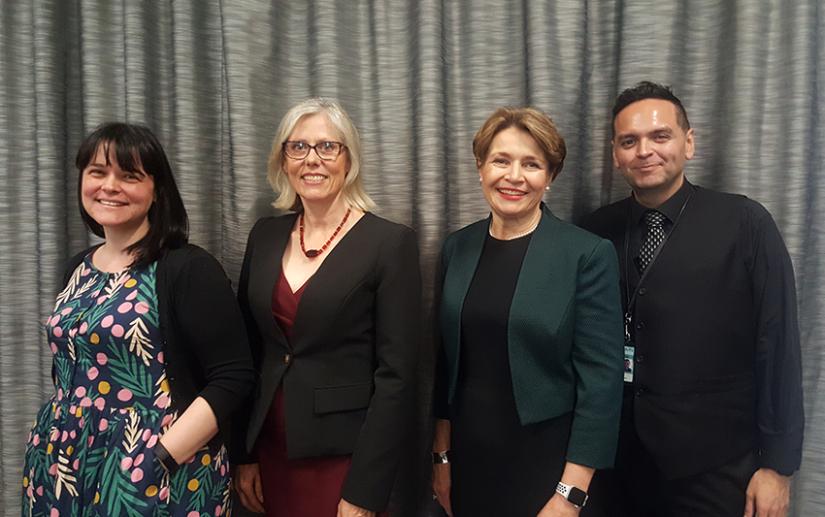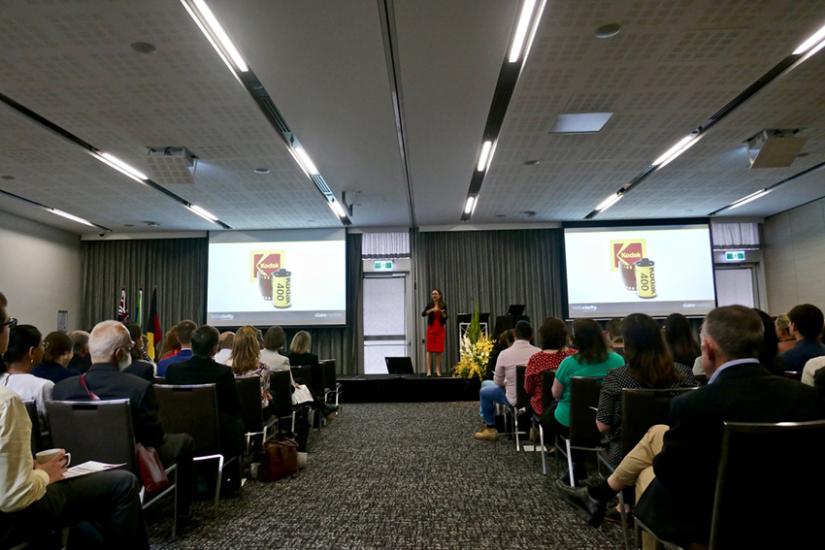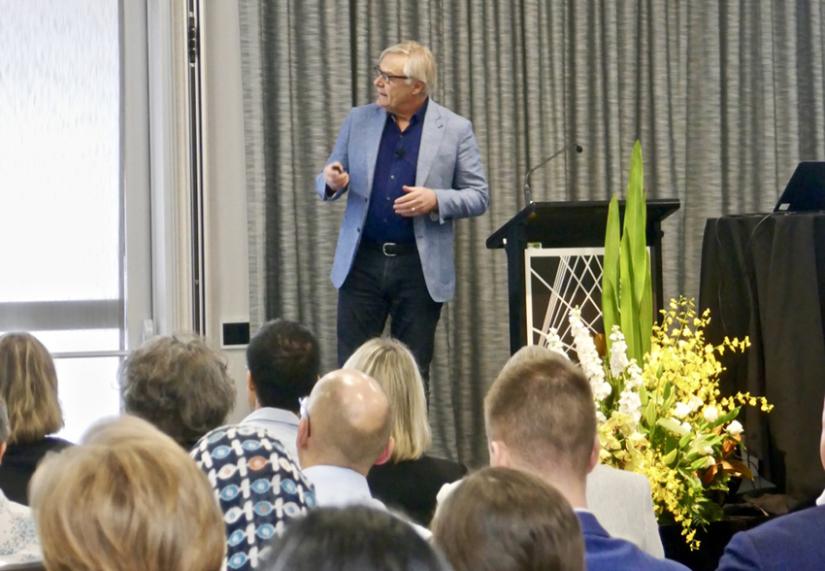Chair's summary
On 16 October 2019, the Academic Board held a forum focused on lifetime of learning: the learner of the future.
The forum’s goal was to present industry insights into the learner of the future and the university’s response under the UTS 2027 lifetime of learning initiative.
Speakers presented on the key skills and attributes that are required in future employees and how they envisage ‘learning for a lifetime’. The forum showed the UTS academic community what future students and graduates will need in order to continue their learning at and beyond university.
Presentations were on topics such as the graduates of the future, industry and community insights: Australia’s automation opportunity, and UTS initiatives including the UTS Futures Academy, developing digital literacy and UTS stackable degrees.
The forum was a full house with around 200 staff and students in attendance.
The main message from the forum was that the future of work is constantly evolving and changing. Our graduates will not only need the requisite skills and abilities to work in their chosen profession, but also the ability to change, adapt and demonstrate resilience and agility as they change roles and move to other employment opportunities.
The UTS 2027 strategy is well positioned to provide our students with these attributes and prepare them for this exciting, but rather uncertain, future.
I would like to thank all presenters and attendees for the very productive discussions.
Joanne Gray, Chair, Academic Board
Program and speakers
For program and speaker bios, see Academic Board forum 2019: Lifetime of learning: the learner of the future (PDF)
Setting the scene
Professor Chris Earley, Dean, UTS Business School and Executive Sponsor of the UTS 2027 lifetime of learning initiative, set the scene by providing an introduction to the initiative, after the Chair welcomed the attendees.
Graduates of the future
Keynote speaker Claire Madden, Founder and Director, Hello Clarity, and author, social researcher and leading voice on Generation Z provided an overview of the future generation. Claire’s research not only focuses on the changing technologies but also their impact on workplaces, educational institutions, families and society.
Claire noted how technological change over the last two decades has been extremely fast, and is likely to continue.
Almost 40 per cent of Australian jobs that exist today have a moderate to high likelihood of disappearing in the next 10 to 15 years due to technological advancements (Committee for Economic Development of Australia Australia’s future workforce report (June 2015)).
Technological innovation is leading to disruption, as the 3As change the world: automation, augmentation and addition (of new jobs). Jobs with low levels of social interaction, creativity, mobility and dexterity are at high risk.
The demographic of generations at work is also fast changing. By 2025, Gen Y and Gen Z will account for 64 per cent of this demographic. Acknowledging Gen Z and Gen Alpha are very different from previous generations is critical. Universities need to adapt to these changes to ensure the graduates of the future are equipped with appropriate skills.
Claire’s presentation shed light on the attributes, attitudes and expectations of the emerging generation and its impact in the learning space.
Industry and community insights: Australia’s automation opportunity
Seckin Ungur, Associate Partner, McKinsey & Company presented on the findings of the McKinsey & Company report, Australia’s automation opportunity: Reigniting productivity and inclusive income growth.
Key findings of the report include the following.
- An estimated 25–46 per cent of current work activities in Australia could be automated by 2030, helping to drive a renaissance in productivity, personal income and economic growth.
- While some jobs will be lost, and others created, all jobs will change.
- If seized, this opportunity could add between $1.1 trillion and $4 trillion to the economy over the next 15 years, providing every Australian with $4000 to $15,000 in additional income a year by 2030.
- Without proactive leadership to manage the transition to the new steady state, automation could have disruptive distributional impacts.
UTS initiatives
UTS Futures Academy
As the business landscape and the nature of work are changing quickly and constantly, and employee skills are gradually becoming outdated, it poses new challenges and opportunities to enterprises and individuals. This doesn’t necessarily mean less work, but it does mean different work.
UTS Futures Academy is bringing that personalised, flexible and future-focused learning to enterprises and their people to keep skills up-to-date and relevant.
As part of UTS initiatives, Professor Robert Wood, Distinguished Professor and Director, UTS Futures Academy provided an overview of the UTS Futures Academy. His presentation covered information on the academy’s mission, target market, approach, solution model, technology partners, examples of subject, content and student profile.
UTS Futures Academy forum presentation (PDF)
Visit UTS Futures Academy for further information.
Developing digital literacy
UTS Library has developed a digital literacy learner profile to frame the delivery of its services to coursework students.
Greater emphasis was placed on building students' capabilities to be creative and resilient thinkers, who critique and advocate for the responsible use of technology and to empower them to lead change.
These changes were based on a systematic review of industry, government and academic literature, combined with an extensive staff digital capability program to build knowledge and expertise as well as develop a culture to support UTS learners.
In the next stage of the project the team will map relevant services from across UTS, and develop a central point for the UTS community to access digital literacy resources.
Developing digital literacy forum presentation (PDF)
Contact Ashley.England@uts.edu.au for further information.
UTS stackable degrees
Associate Professor Natalie Lloyd, Academic Director (Learning and Teaching), Faculty of Engineering and Information Technology presented on UTS stackable degrees.
For these degrees the student comes to UTS with a problem in mind. Be it a challenge in their professional practice, how to address a technological disruption in their workplace or a global problem they wish to address, and picks (or ‘stacks’) the curriculum that will best help them solve that problem. The student and UTS then work together on addressing the problem through studios.
In Autumn 2020, UTS will launch its first three stackable degrees: Master of Creative Intelligence and Strategic Innovation, Master of Technology (MIT), and Master of Professional Practice (MPP). Associate Professor Lloyd provided an overview of the MIT and the MPP, noting the advantages of this format of learning.
UTS stackable degrees forum presentation (PDF)
Photos from the event

(L to R) Ashley England, Arts and Social Sciences team leader, UTS Library; Associate Professor Natalie Lloyd, Academic Director (Learning and Teaching), Faculty of Engineering and Information Technology; Professor Joanne Gray, Chair of Academic Board; and Michael Gonzalez, University Librarian.

Keynote speaker Claire Madden, founder and director, Hello Clarity

Professor Rob Wood, UTS Futures Academy

